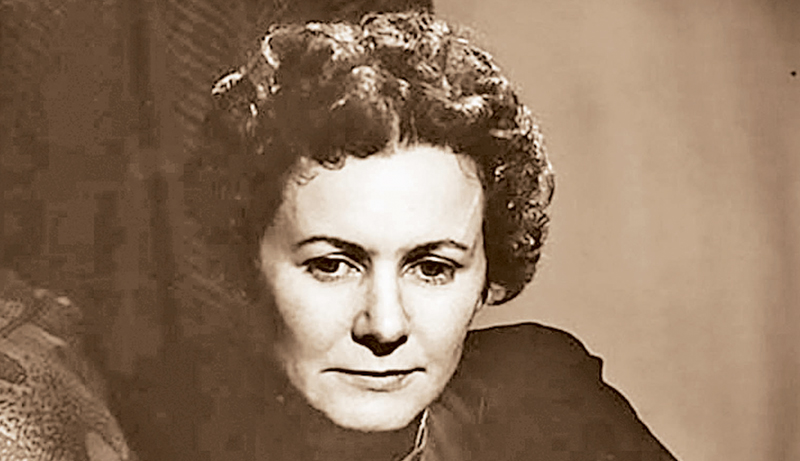As 1936 turned into 1937, the Australian novelist Eleanor Dark found herself embroiled in an epistolary skirmish with her U.S. literary agents. At stake was the fate of Prelude to Christopher, Dark’s startling second book. The story of one man’s calamitous quest for a socially engineered paradise, Prelude melds a gothic plot with a modernist style. At the time, fascism was spreading through Europe. Yet judging by the reaction from Dark’s agents and publisher, America wasn’t interested in a woman’s bleak take on biological determinism and utopianism.
Prelude opens with Nigel Hendon, a middle-age doctor in a small rural town in New South Wales, getting into a car accident which leaves him badly injured. Through a semiconscious haze, he anticipates death as a relief, a solution to the “vast inimical burden” of living. As his mind slides into the past (“disappointed, futile years”), his memories are interspersed with the stream-of-consciousness perspectives of other characters, including his mother, his wife, and the young hospital nurse who secretly loves him (and who has chosen their future son’s name: Christopher). We soon learn that, as a gifted medical graduate in the years before World War I, Nigel formed his own breakaway society. An island utopia, where only the carefully screened “mentally and physically fit” could live, was to be the culmination of his every ambition, the realization of his scientific potential, a shimmering dream whose original preciousness still beckons:
Flat on his back with the gauze mask over his face he went questing as ardently as any knight after his vision of the Holy Grail; and, still again on the white table under the glaring lights, he found it—the island that had become his symbol of attainment. It lay there in his mind, a half-translucent vision, motionless as his own body, born of pictures all but forgotten, of tales told in childhood, even, perhaps, of some remote ancestral legend of Hy-Brazil, the lost Eden, the island of the blessed…
His wife, the intelligent and charismatic Linda, has an alleged family history of homicidal lunacy. For her, Nigel waived the entry requirements, albeit reluctantly. But the central principle of raising “healthy children” from “untainted stock” was, he decreed, inviolable. He and Linda would not—must not—become parents. In the present of the narrative, both weigh the consequences of their youthful decisions: a ruined marriage, indelible trauma from the experiment’s horrific demise, and permanent notoriety. “Hendon’s Colony: What goes on there?” ran the sensational newspaper headlines. “Abominations Practised in the Name of Science; Powers of Evil Reign on Lonely Island.”
Linda, whose all too brief visits to Nigel’s hospital bed raise eyebrows, has a reputation for being unhinged and dangerous, as foreboded by her “tainted stock.” She has witchy sex appeal, with black hair and “indolent” green eyes, and she considers herself “bad all through.” She is treated accordingly by the small-minded locals, no matter how hard she tries to appear calm and poised. “What it would be,” she thinks, “to give up eternally struggling! What kind of voluptuous, evilly exhilarating sensation would one have when one felt one’s self-control slip a cog—and let it slip another—and then let go altogether—all—all—to scream, laugh, fight…”
On its 1934 publication in Australia, when Dark was thirty-three, Prelude was hailed by one critic as “the most mature piece of fiction yet written and published in this country” and by another as “the most distinguished achievement by an Australian writer.” Nevertheless, Curtis Brown’s New York office relayed to Dark that although Macmillan U.S. had recently published Return to Coolami (Dark’s third book, but her American and British debut), they were rejecting Prelude. The publisher contended, dubiously to anyone who has read both, that Prelude was “neither as subtle nor as well executed” as Coolami, a structurally sophisticated but far more anodyne story. Curtis Brown therefore urged Dark to give up altogether on a U.S. edition of Prelude, since if she placed the book with another firm it would “annoy Macmillan considerably.”
From her home in New South Wales, Dark pushed back against this advice. The idea that Prelude was inferior to Coolami, she wrote, “is one that I simply can’t take seriously or finally. Was this the opinion of one reader or several? All the really competent criticism I have had supports my own view that it is an infinitely better book.” In addition, Prelude had just been published to excellent reviews in the UK, where it was named the Evening Standard’s Book of the Month in November 1936. “She has given us a book,” said the newspaper, “that is exciting in the best sense of the word: that doesn’t dope us but wakes us up.”
When Dark enjoyed the further vindication of Prelude’s British edition outselling Coolami’s, she dispatched another letter to New York. The case for Prelude, she argued, “seems to be a pretty sound one, quite apart from my own conviction that it is a far better, if less pleasant, book than Coolami. Without exception the best critics in England and Australia have supported this view.” But Curtis Brown and Macmillan were unmoved. This wasn’t a story that would please the palate of American readers, they maintained, and publishing it would be a strategic error. The Australian author Drusilla Modjeska, who has written about Prelude’s checkered publication history, believes sexist expectations were at play. The story was likely too challenging, too morally ambiguous—in a word, too dark—to sit comfortably with popular notions of a woman writer, especially one from the uncultured colonies down under.
Dark’s passionate advocacy for Prelude was a marked departure from her attitude about her 1932 debut, Slow Dawning, a conventional romance about the travails of a young woman doctor. Dark was embarrassed by the book, dismissing it as a “potboiler” that she wrote “dishonestly” simply to make money. - Paris Review



Add new comment